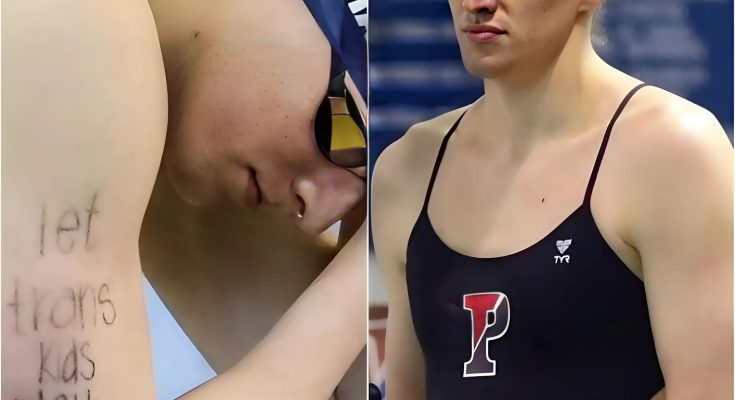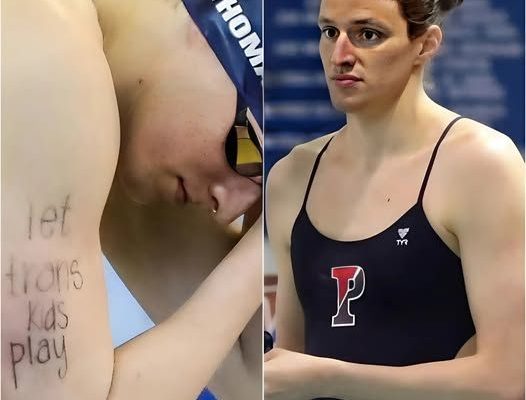The world of sports is no stranger to controversy, but rarely does a single athlete ignite a debate that reverberates far beyond the pool’s edge. Leah Thomas, a transgender woman and competitive swimmer, has been at the center of such a storm—a conversation that has gripped not only the swimming community but the broader public as well. Now, after months of heated discussion, the International Women’s Sports Federation (IWSF) has made a decision that’s sending ripples across social media and sports forums alike: Leah Thomas is banned from participating in women’s sports under its jurisdiction.

For many, this announcement marks a watershed moment. The debate over whether transgender women should compete in women’s sports has simmered for years, occasionally boiling over during high-profile competitions. Thomas’s ascent in women’s swimming brought the issue into sharp focus, with passionate voices on all sides. Supporters championed her right to compete as her authentic self, while critics questioned whether fairness could truly be achieved given the complex interplay of biology and identity.
The IWSF’s decision didn’t come lightly. According to the organization, months of deliberation and consultation with experts led to the conclusion that “scientific consensus” justified their move. Sir Reginald Pompous III, the IWSF president, defended the ruling in a brief statement: “We just need to ensure an equal playing field.” No apologies, no lengthy justifications—just a clear, if controversial, line drawn in the sand.
Almost instantly, the news sparked a digital firestorm. Social media platforms lit up with reactions from fans, athletes, and advocates. Some hailed the decision as necessary for preserving the integrity of women’s sports, while others saw it as a setback for inclusion and equality. The hashtag #LetLeahSwim trended within hours, as passionate supporters rallied to her side. Meanwhile, critics expressed relief, arguing that the move restored fairness to the competition.
What makes this moment so compelling isn’t just the decision itself, but the broader questions it raises. How do we define fairness in sports? Is it possible to balance inclusion with competitive equity? And who gets to decide where those lines are drawn? The IWSF’s ruling, while decisive, leaves these questions largely unanswered. Instead, it has amplified the conversation, forcing fans, athletes, and officials to grapple with issues that defy easy solutions.

Leah Thomas herself has remained largely quiet since the announcement, but her impact on the sport—and the debate—cannot be overstated. For many, she represents the courage to compete as oneself, regardless of the obstacles. Her journey has inspired countless athletes who see themselves reflected in her story. But it has also challenged institutions to reconsider long-standing policies and to confront uncomfortable truths about the intersection of science, identity, and sport.
The physiological differences between cisgender and transgender women have been at the heart of the debate. While some studies suggest that hormone therapy can reduce certain advantages, others argue that physical attributes like bone density and muscle mass may persist. The IWSF cited “scientific consensus” as the basis for its decision, but the reality is that science on this issue is far from settled. Experts continue to debate the nuances, and new research emerges regularly.
Critics of the ban argue that excluding transgender athletes is not a solution. They point out that sports have always been about more than just winning—they’re about participation, growth, and community. Removing athletes like Thomas, they say, sends a message that some competitors are unwelcome, regardless of their dedication or talent.
Supporters of the ban, on the other hand, insist that the integrity of women’s sports must be preserved. They argue that allowing transgender women to compete could undermine the level playing field that female athletes have fought so hard to achieve. For them, the IWSF’s decision is a necessary step to ensure that competition remains fair and meaningful.
Amid the controversy, one thing is clear: the conversation is far from over. Sports organizations around the world are watching closely, aware that their own policies may soon come under scrutiny. Fans are divided, but engaged—debating, discussing, and searching for common ground. Some see this as a turning point, a moment when the world of sports must confront its values and decide what kind of community it wants to be.

For Leah Thomas, the future is uncertain. Will she continue to compete, perhaps in open categories or under different organizations? Will her story inspire lasting change, or will it become a footnote in the ongoing debate? Only time will tell. But for now, her name remains synonymous with one of the most consequential discussions in modern sports.
As the dust settles, athletes, fans, and officials alike are left to reflect on what comes next. The IWSF’s decision may have closed one chapter, but it has opened another—one filled with questions, challenges, and opportunities. Whether you agree or disagree with the ruling, it’s impossible to ignore the impact it has had on the world of sports and beyond.
In the end, the debate over transgender athletes in women’s sports is more than just a question of competition. It’s a reflection of society’s ongoing struggle to balance fairness, inclusion, and respect. As conversations continue and new voices join the fray, one thing is certain: the world will be watching, and the story is far from over.



